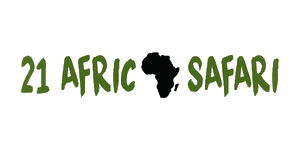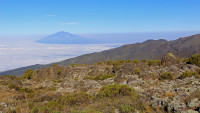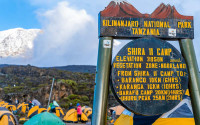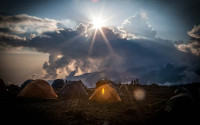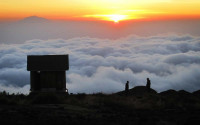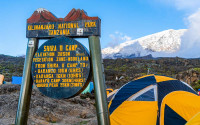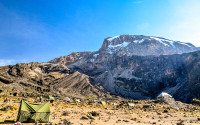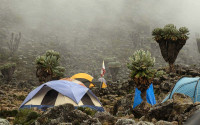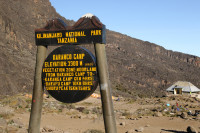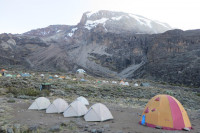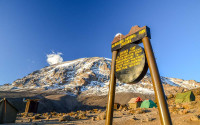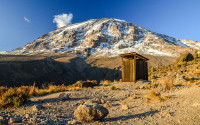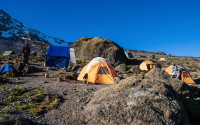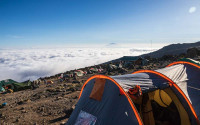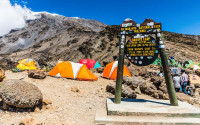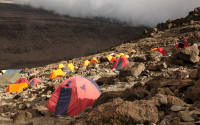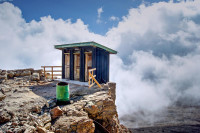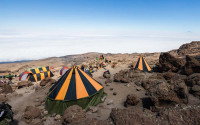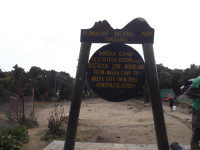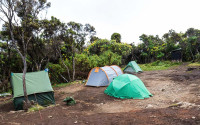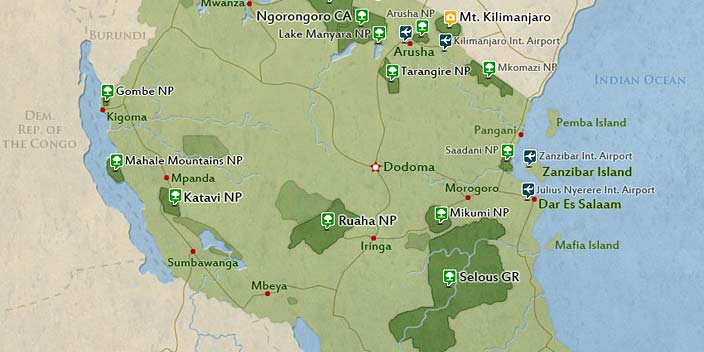
$2,100 pp (USD)
2 travelers on Start dateArrival
Arrival

Day 1
Moshi to Lemosho Gate 1900 m To Mti mkubwa Camp 2650 m
Moshi to Lemosho Gate 1900 m To Mti mkubwa Camp 2650 m
Moshi to Lemosho Gate is the first leg of your journey to climb Mount Kilimanjaro via the Lemosho Route. This route is renowned for its scenic beauty, gradual ascent, and relatively high success rate.
The Journey:
Drive from Moshi: You'll typically start your journey in the bustling town of Moshi, the gateway to Kilimanjaro. From here, you'll embark on a scenic drive towards the western side of the mountain Kilimanjaro, This drive typically takes around 2-3 hours.
Arrival at Lemosho Gate: After a couple of hours, you'll reach Lemosho Gate, the official entry point to Kilimanjaro National Park. Here, you'll complete necessary registration formalities and meet your trekking team, including guides and porters.
Trek to Mti Mkubwa Camp: From Lemosho Gate, you'll begin your ascent through lush rainforest. The trail gradually climbs as you immerse yourself in the natural beauty of the mountain. Your destination for the day is Mti Mkubwa Camp, which translates to "Big Tree Camp.
- Main Destination:
- Mount Kilimanjaro
- Accommodation:
- Budget camping
- Meals & Drinks:

Day 2
Mti Mkubwa Camp 2650 m to Shira 1 Camp 3550 m
Mti Mkubwa Camp 2650 m to Shira 1 Camp 3550 m
Through the Rainforest
Mti Mkubwa Camp to Shira 1 Camp is a significant leg of the Kilimanjaro climb, marking the transition from the lush rainforest to the alpine desert. This trek offers stunning views of the mountain and is a crucial step in acclimatizing to the high altitude.
Key Information:
Distance: Approximately 10 kilometers
Elevation Gain: Around 800 meters
Hiking Time: 4-5 hours
Terrain: Initially through dense rainforest, then transitioning to open moorland and rocky terrain.
What to Expect:
Scenic Beauty: Enjoy the contrast between the verdant rainforest and the barren moorland.
Acclimatization: This hike is essential for adjusting to the higher altitude.
Wildlife: Keep an eye out for colobus monkeys, blue monkeys, and various bird species.
Physical Challenge: The elevation gain and terrain can be demanding, especially for those new to high-altitude trekking.
Tips for a Successful Trek:
Pace Yourself: Take breaks and listen to your body.

Day 3
Shira 1 Camp 3550m to Shira 2 Camp 3840m
Shira 1 Camp 3550m to Shira 2 Camp 3840m
Shira 1 Camp to Shira 2 Camp is a relatively easy day hike on the Shira Route of Mount Kilimanjaro. This trek offers stunning views of the surrounding landscape and is a great opportunity to acclimatize to the higher altitude.
Key Points:
Distance: Approximately 6 kilometers (3.7 miles)
Hiking Time: 3-4 hours
Elevation Gain: Approximately 300 meters (984 feet)
Difficulty: Moderate
Highlights: Shira Cathedral, panoramic views of the Shira Plateau, and Mount Meru
Route Description:
Departure: Start your trek from Shira 1 Camp, a moorland area located at around 3,600 meters (11,811 feet) above sea level.
Shira Cathedral: Hike towards Shira Cathedral, a distinctive rock formation surrounded by steep spires and pinnacles. This is a great spot to take in the breathtaking scenery and capture memorable photos.
- Main Destination:
- Mount Kilimanjaro
- Accommodation:
- Budget camping
- Meals & Drinks:

Day 4
The trek from Shira 2 Camp 3840 m to Barranco Camp 3900 m via Lava Tower
The trek from Shira 2 Camp 3840 m to Barranco Camp 3900 m via Lava Tower
The trek from Shira 2 Camp to Barranco Camp via Lava Tower is a demanding day on the Shira Route, characterized by significant elevation gain and descent. It's a crucial stage in acclimatization as you ascend towards higher altitudes.
Key Points:
Distance: Approximately 8 kilometers (5 miles)
Elevation Gain: Around 783 meters (2,572 feet)
Elevation Loss: Approximately 715 meters (2,346 feet)
Hiking Time: Typically 4-5 hours
Terrain: A mix of rocky trails, scree slopes, and moorland vegetation
Highlights:
Lava Tower: A distinctive volcanic formation that offers panoramic views of the surrounding mountains.
Southern Circuit: A scenic trail that leads you towards Barranco Camp, providing opportunities for breathtaking vistas.
Acclimatization: This stage is essential for preparing your body for the higher altitudes ahead.
Challenges:.
- Main Destination:
- Mount Kilimanjaro
- Accommodation:
- Budget camping
- Meals & Drinks:

Day 5
Barranco Camp 3900 m to Karanga Camp 4010 m
Barranco Camp 3900 m to Karanga Camp 4010 m
The hike from Barranco Camp to Karanga Camp is a pivotal stage in the ascent of Mount Kilimanjaro, renowned for its challenging terrain and stunning panoramic views. Here's what you need to know:
Key Information:
Distance: Approximately 6 kilometers (3.7 miles)
Elevation Gain: Approximately 337 meters (1,105 feet)
Hiking Time: Typically 3-4 hours, depending on fitness and pace
Difficulty: Moderate to challenging, involving a steep ascent known as the Barranco Wall
What to Expect:
Barranco Wall: The most demanding part of the trek, the Barranco Wall is a steep, rocky climb that requires both physical and mental stamina. It's a challenging but rewarding experience.
Acclimatization: If you're feeling symptoms of altitude sickness, take breaks and rest.
Tips for Success:
Pace Yourself: The Barranco Wall can be draining. Take your time and listen to your body.
- Main Destination:
- Mount Kilimanjaro
- Accommodation:
- Budget camping
- Meals & Drinks:

Day 6
Karanga Camp 4010 m to Barafu Camp 4600 m
Karanga Camp 4010 m to Barafu Camp 4600 m
The hike from Karanga Camp to Barafu Camp is a significant step on the journey to summit Mount Kilimanjaro. This section of the climb is characterized by:
Gradual Ascent: The path is a steady incline, allowing trekkers to acclimatize to the increasing altitude.
Alpine Desert: The terrain is barren and rocky, with little to no vegetation.
Breathtaking Views: The hike offers panoramic vistas of the surrounding mountains and valleys.
Key Information:
Distance: Approximately 3-4 kilometers.
Time: Typically takes 2-3 hours.
Altitude Gain: Around 600 meters (1,969 feet).
Difficulty: Moderate to challenging due to the high altitude.
Tips for Success:
Pace Yourself: The key is to maintain a steady pace and listen to your body.
Hydrate Frequently: Drink plenty of water to stay hydrated, especially in the dry alpine environment.
Layer Up: Be prepared for changing weather conditions and dress in layers.
Rest Regularly: Take short breaks to catch your breath and regain energy.

Day 7
Barafu Camp 4600 m to Crater Camp on Kilimanjaro 5650 m
Barafu Camp 4600 m to Crater Camp on Kilimanjaro 5650 m
The journey from Barafu Camp to Crater Camp on Kilimanjaro is a grueling but unforgettable experience. It's often the final push before reaching the summit of Uhuru Peak, the highest point in Africa.
Key Points about the Trek:
Elevation Gain: You'll be ascending from around 15,331 feet (4,673 meters) at Barafu Camp to 18,865 feet (5,750 meters) at Crater Camp.
Difficulty: This is considered one of the most challenging sections of the climb due to high altitude, steep terrain, and the possibility of adverse weather conditions.
Timing: The hike typically takes 7-8 hours, but this can vary depending on individual fitness, pace, and weather.
Route: The trail winds through loose scree and rocky terrain, often passing by glaciers and offering stunning views of the surrounding landscape.
What to Expect:
Early Start: Most climbers begin their ascent to the summit from Barafu Camp in the early hours of the morning to avoid the heat of the day and maximize acclimatization.
- Main Destination:
- Mount Kilimanjaro
- Accommodation:
- camping
- Meals & Drinks:

Day 8
Crater Camp 5650 m to Uhuru Peak 5895 m To Mweka Camp
Crater Camp 5650 m to Uhuru Peak 5895 m To Mweka Camp
The final push to Uhuru Peak from Crater Camp is a thrilling and challenging experience. This iconic summit is the highest point in Africa, offering breathtaking views and a sense of accomplishment like no other.
Key Points:
Distance: Approximately 1 km (0.6 miles)
Elevation Gain: Minimal
Time: 1-2 hours, depending on pace and conditions
Difficulty: Moderate to challenging, due to high altitude and potential for altitude sickness
Best Time: Early morning, to avoid crowds and potential afternoon thunderstorms
The Journey:
Departure from Crater Camp: Typically, climbers depart from Crater Camp around midnight or early morning to reach the summit at sunrise.
Ascent to Uhuru Peak: The trail follows the crater rim, offering stunning views of the surrounding glaciers and peaks. The final ascent to Uhuru Peak is steep and may require some scrambling.
Summit Celebration: Upon reaching Uhuru Peak, climbers can celebrate their achievement, take photos, and enjoy the panoramic views.
- Main Destination:
- Mt Kilimanjaro Summit
- Accommodation:
- Budget camping
- Meals & Drinks:

Day 9
Mweka Camp 3100 m To Mweka Gate 1640 m To Moshi
Mweka Camp 3100 m To Mweka Gate 1640 m To Moshi
A Final Descent
The hike from Mweka Camp to Mweka Gate marks the end of your Kilimanjaro adventure. This final descent is generally a pleasant experience, with a steady decline through lush rainforests.
Key Details:
Distance: Approximately 9 kilometers (5.6 miles)
Elevation Loss: 1400 meters (4600 feet)
Beautiful Scenery: Enjoy the last glimpses of Kilimanjaro's diverse ecosystems, including the montane rainforest.
Steady Descent: The trail is generally a gradual downhill, making it easier on your legs after the ascent.
Wildlife: Keep an eye out for various bird species and potentially monkeys in the forest.
Mweka Gate: At the end of the trail, you'll reach Mweka Gate, the official exit point from Kilimanjaro National Park.
Tips for the Descent:
The descent from Mweka Camp to Mweka Gate is a rewarding experience that concludes your Kilimanjaro adventure. Enjoy the final moments of your journey and savor the sense of accomplishment, then transfer to Moshi.
- Main Destination:
- Mount Kilimanjaro
- Accommodation:
- No accommodation (End of tour)
- Meals & Drinks:

